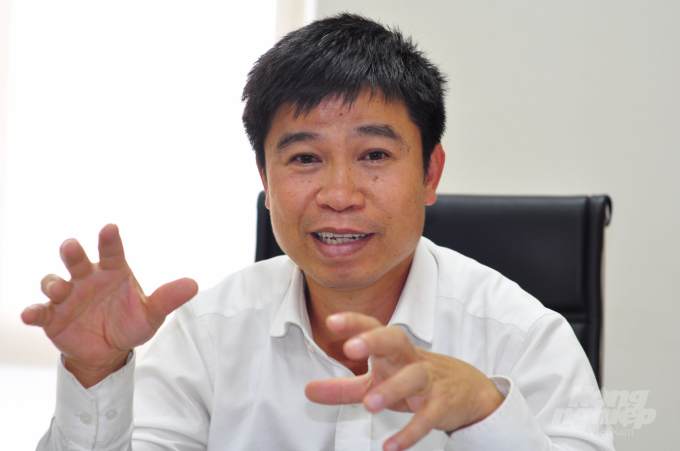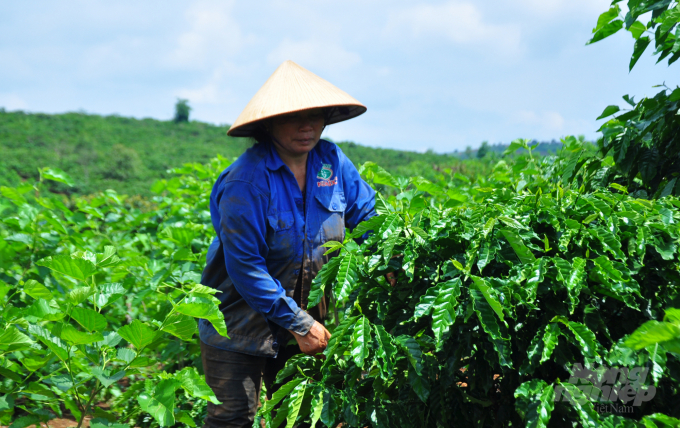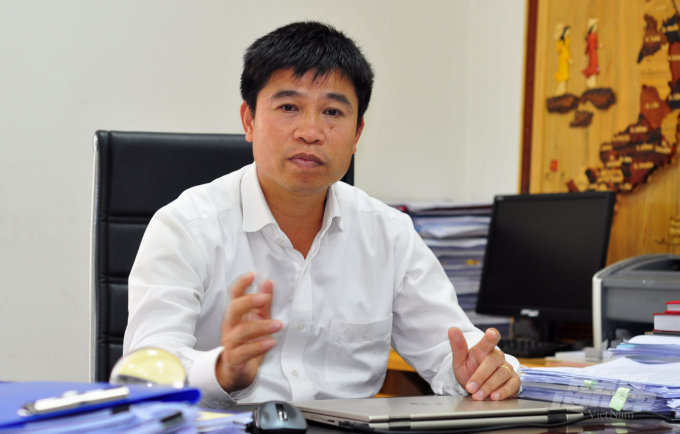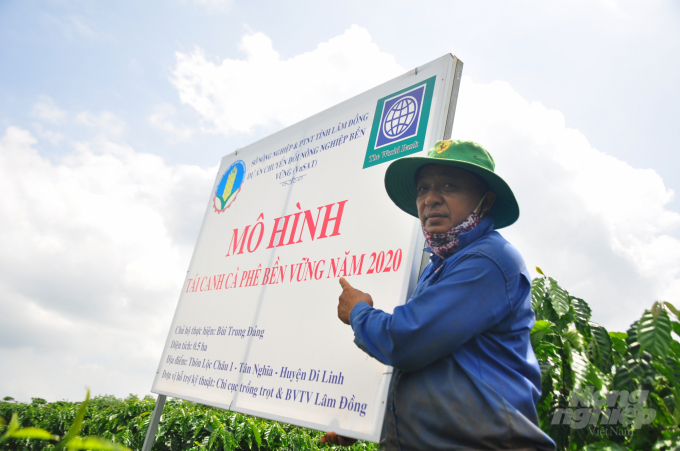June 2, 2025 | 14:03 GMT +7
June 2, 2025 | 14:03 GMT +7
Hotline: 0913.378.918
June 2, 2025 | 14:03 GMT +7
Hotline: 0913.378.918
In recent years, the Vietnam Sustainable Agriculture Transformation Project (VnSAT) has brought benefits in real-world, contributing to boosting the sustainable development of the coffee industry in Lam Dong province. Particularly the project has helped to connect farmers, cooperatives with processing and roasting businesses to create a chain and add values to the coffee commodity.
Nguyen Van Chau, Deputy Director of Lam Dong’s Department of Agriculture and Rural Development told Vietnamese Agricultural News that VnSAT Lam Dong was launched by the Department of Agriculture and Rural Development of Lam Dong in 8 districts and cities in order to develop the coffee industry sustainably. It was carried out in the five year period from 2015 to 2020 and extended to the end of 2022.
The project aimed at increasing farmers’ income and reducing negative impacts on environment through the application of sustainable coffee farming methods.

Nguyen Van Chau, Deputy Director of Lam Dong’ Department of Agriculture and Rural Development. Photo: Minh Hau.
So far, VnSAT Lam Dong has attracted around 56,329 participants. The area of coffee cultivation applying sustainable farming methods was 14,303 hectares, above 10,000 hectares as planned. The farmers participating in the project have seen an increase of 20,73% in profit compared with 20% set by the project .
Could you please talk about the changes of the province’s coffee industry since VnSAT was implemented?
The project has provided farmers with technical knowledge through farmer field schools (FFS) combined with designing demonstration models for them to practice.
With the application of techniques, the productivity and quality of coffee have been improved. The average yield was 2.5 quintals per hectare in 2016 and it increased to 31.9 quintals and 32.1 quintals per hectare in 2019 and 2020 respectively. The participants have seen an increase of 20.73% in profit.

VnSAT has provided technical knowledge to coffee growers through farmer field schools (FFS). Photo: Minh Hau.
The project has helped to improve the role of farmers in the linkage chain. The participants have been trained to improve their abilities and skills on team management, market information exploration, contract negotiation and financial management. It has also contributed to strengthening and building the models of farmer's organizations within the framework of VnSAT launched by the Ministry of Agriculture and Rural Development.
At the same time the project has upgraded essential infrastructures to serve coffee production in the area such as drying grounds, warehouses, and intra- and near-coffee growing area roads.
With the funding from the project, the farmers could invest in drying and preliminary-processing machines to improve the quality of the coffee bean and reducing waste after harvest .
What do you think about the spill-over effect of the project?
VnSAT Lam Dong has provided support to 44 farmers' organizations in the province's key coffee-growing areas in which 14,000 households have been instructed to adopt sustainable farming approaches for their coffee plantations.
The project also helped the cooperatives be equipped with warehouses, drying grounds, processing and drying machine to perfect their coffee processing procedures and improve the quality of coffee.
In recent years, VnSAT has become a bridge that connected cooperatives with input suppliers and processing and roasting enterprises to create a chain from production to consumption and improve the value chain.

According to Nguyen Van Chau, Deputy Director of Lam Dong's Department of Agriculture and Rural Development VnSAT has spread sustainable coffee value chain widely. Photo: Minh Hau.
The project has been implemented in 8 districts/cities which are key coffee-growing areas in Lam Dong covering 16,500 hectares with the participation of 15,000 households. Even so, the figures were quite small compared with the province's total coffee growing area. However, VnSAT project had spillover effect on the local farmers. Nearly 54,4000 farmers have participated in the project so far.
Through training courses, seminars, propaganda programs, more and more people knew about the outcomes of VnSAT’s demonstration models along with the technical support and infrastructure investment of the project.
What do you think about the achieved results? Does Lam Dong have any plan to make VnSAT project go further and spread it across the province in the next time?
From my point of view, the implementation of VnSAT in the area is indeed effective and it is suitable for what the province's coffee industry is looking forward. This is a nation-level project that is designed and thoroughly deployed from the Central to local levels with the engagement and involvement of a team of technical advisors from the departments, institutes and agencies under the ministries.
The technical process for producing and replanting old coffee plants sustainably is applied for the whole project. It set a wide range of criteria to evaluate the performance of farmers after each training program. Outcome evaluation each year will be used for the next training program.

VnSAT Lam Dong has not only benefited coffee growers but also had a strong spill-over effect. Photo: Minh Hau.
In the areas where VnSAT was implemented farmers’ mindsets have positively changed through each year. They realized benefits when applying recommended technical process for example proper fertilizer application, increasing the use of organic fertilizers to reduce input costs but still provide enough nutrients for trees.
The farmers’ knowledge has become deeper and wider. They are willing to adopt something new and effective to their plantations. They have boldly invested in water-saving technology and machines to increase the investment’s efficiency in accordance with the province’s development strategy.
However the project has just been implemented for a short period around five years in which the first year of the project is for completing policies and mechanisms. Not until the second to fifth year the project can go into operation. And the project may end when the farmers have just started to get acquainted to the new practices. Therefore there is a high chance they will turn back to their old farming methods.
"I think the project should be designed to be implemented for seven to eight years for industrial and fruit trees so that farmers have enough time to change their farming habits and evaluate the efficiency of the investment. If not, I propose that the Ministry of Agriculture and Rural Development continues to asked the provinces to take advantage of the results achieved from the project to maintain and multiply VnSAT’s successful models,” said Nguyen Van Chau.
Thank you!
Translated by Mai Tham

(VAN) Several scientists and farmers are experimenting with soil treatment in some key durian-growing regions such as Cai Lay (Tien Giang), Dak Song, Gia Nghia, and Dak R’lap (Dak Nong).
/2025/05/25/4127-3-073637_820.jpg)
(VAN) Thanks to the promotion from an FAO-implemented project, vegetable production in greenhouses in Moc Chau has seen strong development, from 1.5 hectares in 2021 to nearly 50 hectares in 2024.

(VAN) FAO has recently supported USD 140,000 to implement the project 'Risk mitigation human-animal interface risks through disease control initiatives in pig farming.'

(VAN) The People's Committee of Tra Vinh province has approved an adjustment to the investment policy for the Green Hydrogen Plant project, increasing its area to approximately 52.76 hectares.
![Reducing emissions from rice fields: [2] Farmers’ commitment to the soil](https://t.ex-cdn.com/nongnghiepmoitruong.vn/608w/files/news/2025/05/05/dsc08881jpg-nongnghiep-140632.jpg)
(VAN) Clean rice cultivation model in Thuong Tan commune, Bac Tan Uyen district, is assisting local residents in achieving sustainable agriculture by substantially reducing costs, increasing productivity, and protecting the environment.

(VAN) At the conference to disseminate Resolution No. 68, AgriS introduced its digital agricultural ecosystem and reaffirmed its commitment to accompanying the Government in promoting private sector development and sustainable agriculture.

(VAN) 'Blue Ocean - Blue Foods' initiative is designed to restore marine ecosystems and establish sustainable livelihoods for local communities by cultivating a minimum of 1,000 hectares of cottonii seaweed in the first three years.